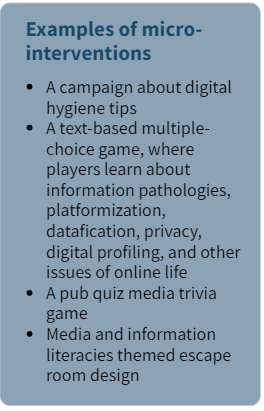Media in the Era of Disinformation (& Media and Information Literacies’ Micro-Interventions)
Course Summary:
Launching from deep concern for the digital public sphere, the online course "Media in the Era of Disinformation" (MEDI) at UT empowers BA/MA students to combat online hostility and misinformation. The course fosters active citizenship and equips students with skills in contemporary journalism while building a knowledge base on topics like information disorders, propaganda, mediatisation and social media communication. Students focus on creating positive change with impactful (mini)interventions, such as a campaign on digital hygiene tips, media and information literacies themed escape room design and a pub quiz on media trivia. The micro interventions-approach advances students’ existing media and information literacies, social skills and acknowledges the shared responsibility of digital spaces. The spin-off course, "Media and Information Literacies' Micro-Interventions" (MILMI), expands on these micro interventions, fostering collective efforts to reclaim and reshape toxic digital spaces.
Course Design:
Course Objectives
The student:
- gains familiarity with interventions at local and international levels, encompassing both governmental and non-governmental strategies, aimed at countering information disorders.
- develops an awareness of crucial aspects related to online etiquette, freedom of speech, and defamation.
- acquires knowledge of appropriate channels to turn to in cases of online harassment or troll attacks.
- masters the main theoretical pillars of behavioral insight and nudging.
- independently analyze the impact of interventions on micro, meso, and macro levels.
- systematically collect data and contribute effectively as a member of a research group.
- gains proficiency in using various e-learning opportunities and reflect thoughtfully on experiences, specifically in utilizing e-learning platforms for cooperation and group work.
Active Teaching Methodologies
- Preparatory and Closure Tasks:
Every topic has some independent prep-work and closure-tasks. The specific tasks help students to prepare for the topic, give the base level knowledge that seminars and lectures will build upon. Closure-tasks anchor and strengthen the knowledge/skills acquired. For example, for the topic media logic, students were asked to provide an example of a situation where they observed individuals adapting their behaviour based on media influence or socialization. Another task for AI-drawing and visuals asked students to experiment with Dall-E or Midjourney to create digital images, explaining the tools used, adjustments made, and reasons for selecting specific prompts. They are also asked reflect on both positive and negative aspects of these technological advances.
- Study Diary/Portfolio:
Students also maintain an informal study diary or portfolio throughout the course to foster reflexivity and deeper learning. They document insights gained from lectures, seminars, and personal reflections and as well accumulate a total of 15 points based on the richness and depth of their entries.
- Final Project:
For the final project, groups of 4-6 students design and execute a mini-intervention aimed at enhancing people's media, information, and digital literacies in an innovative manner suitable for the attention economy and information disorders. They receive detailed instructions and consultations throughout the course to guide their project.
Contact:
Maria Murumaa-Mengel:
